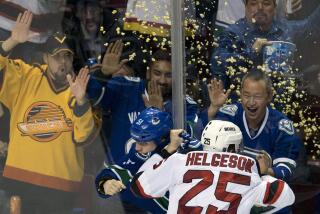Rocky Nights
MONTREAL — Rue Saint-Antoine was deserted, the quiet broken only by the occasional whoosh of a car or the tread of a pedestrian bundled up against the evening chill.
It should have been a bustling street, crowded with people going to the Bell Centre for the Canadiens’ game against Carolina. Kids should have been waiting outside the parking garage for players’ autographs; adults should have been dissecting the Canadiens’ power play in French or English, with equal passion.
The street was empty because the Canadiens didn’t play that night. Nor will they play on any night soon.
The NHL has been in suspended animation since Sept. 15, when Commissioner Gary Bettman locked players out after the expiration of the labor agreement between the league and the players’ union. There have been no negotiations since Sept. 9, offering little hope that the season will be saved.
Until now, few fans in hockey-mad Canada have been perturbed by the NHL’s absence. Some turned to junior hockey, which has enjoyed a slight attendance increase. Others are following the Canadian Football League. The baseball playoffs were a strong lure, as many Canadians rooted for the Red Sox and former Expo Pedro Martinez. In Montreal, warm days and the glorious blaze of orange, yellow and red on the slopes of Mt. Royal made it easy to put aside thoughts of hockey.
But baseball is over, and the CFL’s regular season ended Saturday. Winter will come, but the Canadiens will not be a diversion on cold Montreal nights, leaving a hole in the rich tapestry of life in this cosmopolitan city.
“A little bit I miss it now,” said Julien Poirier, an engineering student who watches or listens to most Canadien games. “I blame the players. They’re good at what they do, but salaries always go up.
“Me, when they come back, I will be happy.”
Poirier now plays hockey on nights he would have watched or listened to the Canadiens. Christian Gagne, also a university student, has become a minor hockey coach. “When I was younger I played hockey, and I was able to learn from a volunteer coach how to skate and shoot,” he said. “If I can teach some kid the same thing, hopefully he will have the same good memories.”
Shared memories of hockey -- whether of Canada’s dramatic victory over the Soviets in the 1972 Summit Series or of skating on ponds and rinks from British Columbia to Newfoundland -- create some of the strongest common threads in an increasingly diverse country.
Nowhere else could Don Cherry, a mediocre coach who reinvented himself as a bombastic analyst on the Canadian Broadcasting Co.’s “Hockey Night in Canada” telecasts, be revered as he is here, where he’s vying with artists, politicians and writers for top honors in the CBC’s “Ten Greatest Canadians” series.
But with no NHL hockey, there’s no “Hockey Night in Canada.” In its place the CBC is airing “Movie Night in Canada,” starting with the three “Indiana Jones” flicks.
“I don’t know how many movies they have there to show,” said Derek Leedahl, a fireman in Saskatoon and longtime friend of Mighty Duck Coach Mike Babcock. “Saturday nights were always the nights we’d have doubleheaders and have quiet time with the family. It was our time to sit and watch the game.”
Danny Flynn, coach of the Canadian university champion St. Francis Xavier X-Men and a part-time scout for the Kings, also misses his old routine.
“Hockey is such a big part of Canadian culture that it doesn’t seem normal that here we are in October and ‘Hockey Night in Canada’ is not part of our activities,” he said by phone from Antigonish, a town of about 10,000 that traditionally roots for Montreal and Boston teams.
“There’s so much hockey in Canada that people can still get their fix, whether by watching college or junior. Hockey at all those other levels will enjoy an increase in attendance. I think people are finding them. They will be big winners.”
Cathie Skinner of Toronto, a 50-year-old mother of two who works in the paint department of a Home Depot, didn’t have to find new pastimes. A hockey fan since childhood, when she rode the streetcar to Maple Leaf Gardens and kept scrapbooks devoted to her favorites, she plays hockey twice a week, in a women’s league and in a loosely organized coed group.
Skinner, whose husband died of a heart attack while playing hockey a year and a half ago, rarely goes to Maple Leaf games. “They’re really pricey.... I’d rather feed my kids,” she said. So the lack of NHL hockey hasn’t had much of an effect.
“I do miss it, but not terribly,” she said. “Because you play, you don’t miss them so much. There’s a lot of great hockey and a lot of women’s hockey.
“Instead, I’m filling the slot with movies. If it was around, we’d get a six-pack and I’d be watching.”
For Skinner and many other Canadians, hockey and NHL hockey are separate entities. For kids, playing hockey is part of growing up. For adults it’s a social activity, played at lunchtime or on weekends the way Americans play softball or basketball. The score is often irrelevant in pickup games; the rewards are exercise, friendship and affirmation of their distinctiveness as Canadians.
Morton Weinfeld, a professor of sociology at McGill University in Montreal, said hockey in general -- not the NHL’s product -- remains “a religion” in the city.
“Unlike the U.S., Canada has had, and has, a weak national identity,” Weinfeld said. “If baseball weakens at the core, in the U.S., there are other elements of geopolitics to pick up the slack. In Canada, we don’t have those elements. When hockey is weak, there’s going to be more of a void. ...
“I think you can look back and see that 1972 was the height of national pride. Canadian identity as a nation is still fragile, so if hockey wavers it might have more consequences than it would have in the U.S.”
Desmond Morris, founding director of the McGill Institute for the Study of Canada and a history professor at the university, says the NHL occupies a less exalted place in Canada than a generation ago and that fewer people identify with NHL teams.
“If you come out of northern Ontario and you’re a boy, and maybe a girl, that’s your ticket out of there. That’s how it used to be, and it’s not that way to some degree,” he said. “When teams are full of foreigners, it’s not as interesting. When the kid from your little mining town can’t make the team, you don’t identify with the team. It goes down several notches in interest.”
The low-scoring style that has dominated the NHL the last decade, he said, has stripped the league of its luster. “The standard of play is so defensive and so boring, it hasn’t got as much attraction for spectators who know the game,” he said, “and I can’t see that it would be an attraction for those who don’t know the game.”
He paused, then added, “Of course, winter cometh, and it will be harder to find things to do.”
Will fans’ resolve soften when ice hardens on Canada’s rivers and ponds?
Roy MacGregor, a columnist for the Globe and Mail -- a national newspaper in Canada -- said players on the four teams he skates with have expressed nothing but “vitriol and ‘a pox on both their houses’ ” toward NHL players and owners. He’s sure his teammates won’t be swayed.
“What will happen in January? Are Canadians going to go out and watch curling? I don’t think so,” he said. “People forget that in Canada, hockey exists without the NHL. There’s junior hockey and minor hockey and pickup hockey. In the southern U.S., the NHL is the only thing they see.
“By and large people feel they’re part of the cause, and our bit as citizens is to not show impatience because the NHL can’t come back as an economic model that’s obviously broken and the terrible mess they’ve turned it into.”
Skinner favors neither players nor management.
“In the old days, when I was a kid, players seemed to play for the love of the game. It’s not like that now,” she said.
“It’s hard to feel bad for the millionaires who are fighting the billionaires. They’ve affected thousands upon thousands of people, like workers at the Air Canada Centre who have lost their jobs. I hope they get it all sorted out, but at present, I don’t miss it.”
*
(BEGIN TEXT OF INFOBOX)
LOCKOUT AT A GLANCE
A look at the NHL lockout through Wednesday:
* TOTAL DAYS OF LOCKOUT: 49.
* TOTAL DAYS OF SEASON MISSED: 22.
* GAMES LOST WEDNESDAY: 7.
* TOTAL GAMES MISSED: 139.
* NEGOTIATIONS: The NHL and the players’ association haven’t held a negotiating session since Sept. 9 -- one week before the lockout was imposed -- but NHLPA senior director Ted Saskin met with Bill Daly, the NHL’s chief legal officer, Oct. 26 in New York. Lockout issues weren’t discussed, and no talks are scheduled.
More to Read
Go beyond the scoreboard
Get the latest on L.A.'s teams in the daily Sports Report newsletter.
You may occasionally receive promotional content from the Los Angeles Times.







